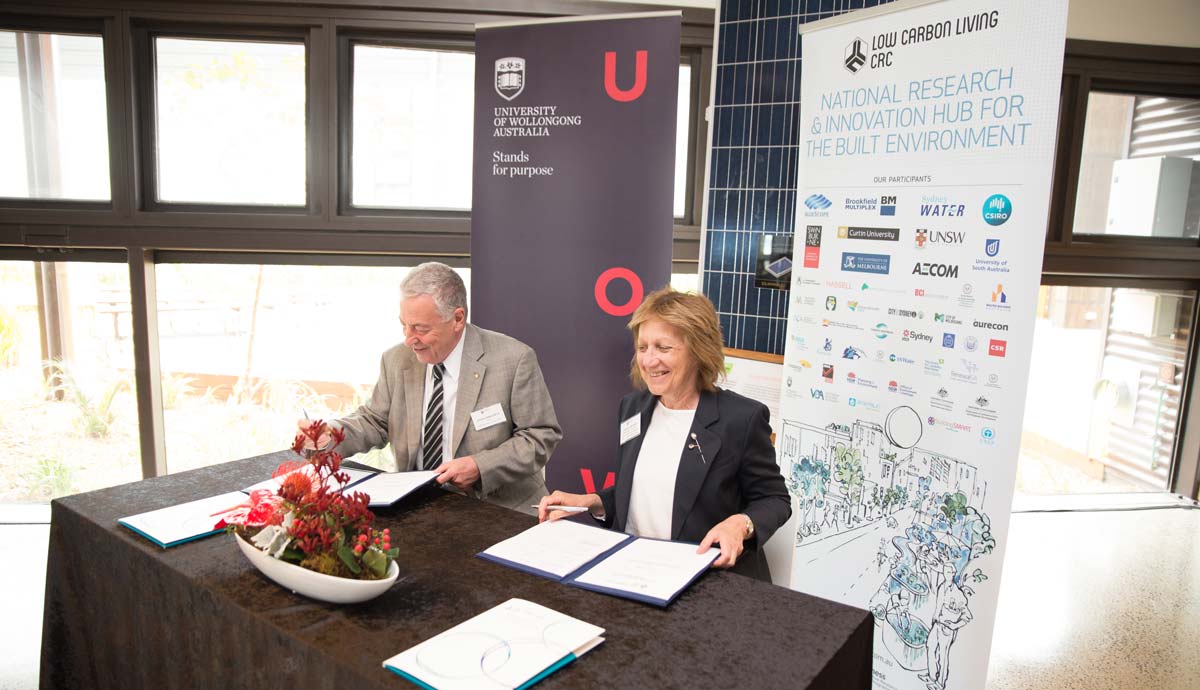November 14, 2016
Sustainable building expertise added to centre focused on low carbon living
Research project will assist in designing and implementing low-carbon upgrades to community and public housing
University of Wollongong’s (UOW) engineers and built environment researchers will join a two-year project that will help provide community and public housing providers with the tools and knowledge to make retrofits that improve sustainability and liveability.
UOW’s Sustainable Buildings Research Centre (SBRC) will become a research participant in the Cooperative Research Centre for Low Carbon Living (CRCLCL).
The formal announcement will be made at a launch event at SBRC facility at UOW’s Innovation Campus on Monday 14 November.
Low Carbon Living CRC Chair the Hon Robert Hill AC said SBRC’s work was a perfect fit with its programs, particularly Program 1, Integrated Building Systems.
“UOW’s Sustainable Buildings Research Centre has been a leader in developing and applying new products and services in low carbon community housing,” he said.
“Community housing is a particularly challenging part of reducing carbon in the built environment because of pressure on costs. It is also a large housing stock and thus very relevant to Australia’s overall carbon reduction challenge.
“UOW has contributed its research expertise in close collaboration with industry. It has addressed both new housing stock and retrofits. UOW is therefore a good fit for the CRCLCL and it’s pleasing to see it join the CRC’s five existing university and CSIRO participants to help achieve a better carbon outcome.”
The Low Carbon Living CRC is Australia’s leading national hub for research and innovation in the built environment sector.
UOW joins five other partner universities and 48 industry and government participants in the mission to lower carbon emissions in the Australian built environment and deliver competitive advantage for industry.
The SBRC researchers, with $473,477 in CRCLCL support and $50,000 from the Office of Environment and Heritage, will develop a project called 'Mainstreaming Low Carbon Retrofits in Community Housing'.
SBRC Director Professor Paul Cooper said the project would assist community and public housing providers in integrating low-carbon retrofits and refurbishments into their property maintenance and upgrading processes.
“Unlike owner-occupied buildings, the large stock of social and community housing is managed through a centralised process,” Professor Cooper said.
“Our team will establish living laboratories in Port Kembla, South West Sydney and the NSW Central West, where the performance of existing stock and the impact of retrofits and upgrades will be assessed and where the new decision-support resources, tools and processes will be tested and refined.
“By directly engaging with providers, we believe this project has the potential to make a significant impact in mainstreaming low-carbon technologies, systems and processes.”
The expertise in retrofitting is grounded in SBRC’s experience with the student-led Illawarra Flame House, which was the winning entry to the Solar Decathlon China 2013 competition.
SBRC itself is based in a 6-Star Green Star building that serves as a living laboratory for research and development of sustainable building technologies and methods.
UOW is no stranger to working with CRCs, playing a leading role in eight other Centres.
“Our experience working with CRCs has strengthened our view that they are an extremely effective way of achieving results and creating supportive collaborations,” UOW Deputy Vice-Chancellor (Research and Innovation) Professor Judy Raper said.
“This project is an example of challenge-led research the University has championed and that demonstrates how an interdisciplinary approach is vital to address the truly significant problems the world faces.”
